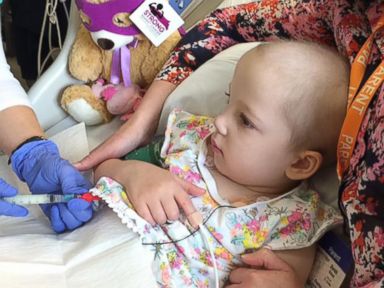
A cancer-stricken girl from the U.K. is in remission after her family raised $180,000 to get her to the U.S. for an experimental treatment.
Erin Cross, 6, was released from Seattle Children’s Hospital last week after undergoing an experimental treatment designed to utilize her immune system to fight cancer. The girl was diagnosed with a virulent form of leukemia called acute lymphoblastic leukemia (ALL) at age 2. While initial treatment put Erin in remission, her doctors warned the cancer was likely to return. Erin’s mother, Sarah Cross, said the family started to look at other options and became more interested in technology where doctors re-engineer a patient’s own t-cells to fight cancer, part of a growing treatment field called immunotherapy.
“When she relapsed, that’s when all that research [helped],” Erin’s mother Sarah Cross told ABC News.
Erin’s doctor contacted the team at Seattle Children’s Hospital to see if Erin could be entered into an experimental medical trial where doctors re-engineer the t-cells so that they recognize a specific protein on leukemia cells called CD19+. The engineered t-cells are designed to attack the leukemia cells, similar to how they attack other viruses or bacteria in the body.
While the experimental treatment itself was covered by the hospital, any other traditional treatment for Erin would have to be covered by the family. Cross said they did not have insurance that would cover medical treatment in the U.S. since they live in the U.K., which has a national health care system. In order to raise medical funds, Cross turned to social media to get her daughter to Seattle. An online campaign shared on Twitter helped raise $180,000 for Erin, her mother said. Celebrities in the U.K. retweeted Erin’s story, drawing attention to the fundraiser.
“The majority of the money was raised in a few days,” Cross said.
Cross and Erin arrived this summer at Seattle Children’s Hospital to get the experimental treatment. In a Phase I trial of the experimental treatment, which is designed to test if a treatment is safe rather than effective, 93 percent of the patients experienced remission.
However, after a year, approximately 50 percent of these patients had some kind of relapse, according to Dr. Rebecca Gardner, who is leading the study at Seattle Children’s Hospital. The treatment is still experimental and Erin is taking part in a Phase II trial, where researchers examine how effective a treatment is. Only children and young adults with ALL who had exhausted standard options of cancer treatment are allowed to participate in the trial, since the treatment is not the medical standard of care for leukemia treatment.
“She got here and towards the end of July,” Gardner said. “Then there is a series of eligibility requirements … then she was able to get her t-cells within a month” of arriving.
The cells are taken in a three-hour process where they’re separated from the blood. Once re-engineered to recognize the CD19+, they are able to be infused back into the blood and hopefully start attacking the leukemia. The process to get the infusion is just a few minutes, compared to hours of infusion for chemotherapy. Cross said hospital staff even brought a “T-bear” with Erin’s t-cells to put the girl at ease.
“There’s a huge build up for the day the t-cells came through the door in the hospital room,” Cross said.
After the infusion, Erin was able to go back to the Ronald McDonald House, where the family was staying, without any immediate reaction. But within a few days, the girl developed a persistent fever, likely a result of the t-cells fighting the leukemia.
“It’s as if you were fighting a bad infection,” said Gardner, who said symptoms can be mild to severe. “It can be persistent fevers to more severe [complications] like needing ICU care.”
For three weeks the girl remained in the hospital. At one point Erin was so sick she started suffering seizures and was on a ventilator. Doctors were able to treat the immune response and eventually Erin’s symptoms subsided and she was taken off the ventilator.
“She all of a sudden got her energy,” Cross said. “We were hoping and praying that the bone marrow would be clear. “
Last week, Gardner was able to test Erin’s bone marrow. Before the infusion, 26 percent of Erin’s bone marrow cells were leukemia cells, last week, Erin had no sign of leukemia in her cells.
“As the days progressed from then, she’s just gotten stronger,” Cross said. “It’s the first time she’s been leukemia-free since March.”
Going into remission does not mean Erin is cured of the disease, and Gardner said they will continue to watch how she progresses and look to see if the engineered t-cells remain in her body or if she relapses.
Cross said her daughter still shows some side effects from the treatment, including a tremor, that doctors will monitor before they return home. When back in the U.K., Cross said Erin is expected to get a bone marrow transplant to help fight any remaining cancer.
“She’s a normal 6-year-old, fun-loving,” Cross said. “She wants to arrange a dance off,” with a nurse.
